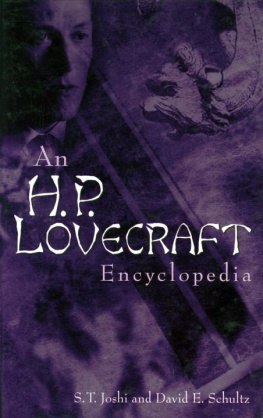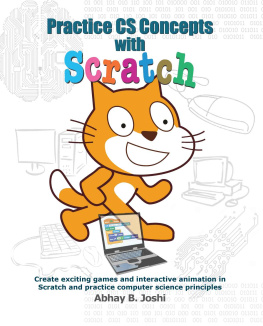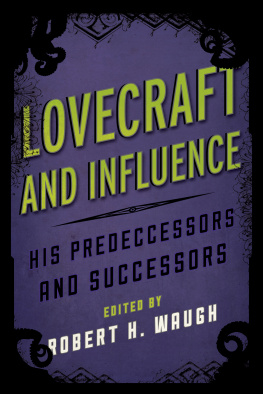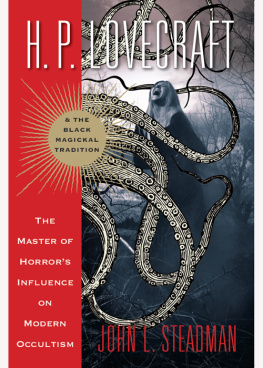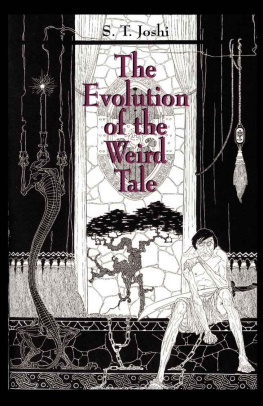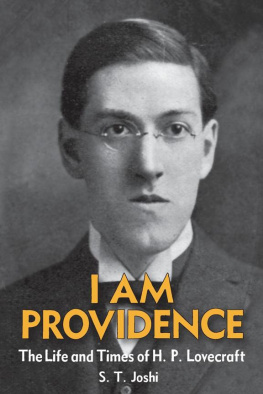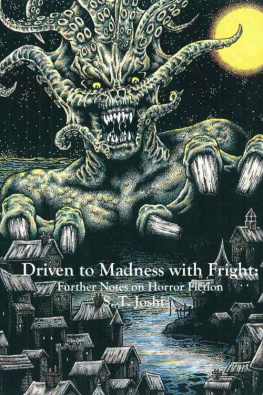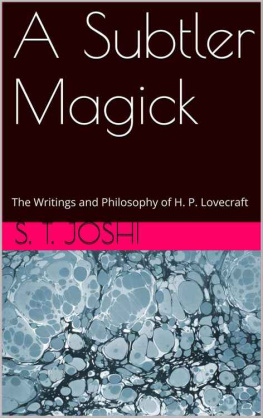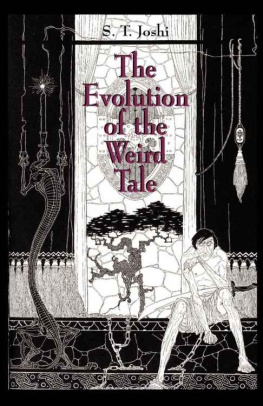Joshi Sunand T. - An H.P. Lovecraft encyclopedia
Here you can read online Joshi Sunand T. - An H.P. Lovecraft encyclopedia full text of the book (entire story) in english for free. Download pdf and epub, get meaning, cover and reviews about this ebook. year: 2007;2004, publisher: Hippocampus Press, genre: Detective and thriller. Description of the work, (preface) as well as reviews are available. Best literature library LitArk.com created for fans of good reading and offers a wide selection of genres:
Romance novel
Science fiction
Adventure
Detective
Science
History
Home and family
Prose
Art
Politics
Computer
Non-fiction
Religion
Business
Children
Humor
Choose a favorite category and find really read worthwhile books. Enjoy immersion in the world of imagination, feel the emotions of the characters or learn something new for yourself, make an fascinating discovery.
- Book:An H.P. Lovecraft encyclopedia
- Author:
- Publisher:Hippocampus Press
- Genre:
- Year:2007;2004
- Rating:5 / 5
- Favourites:Add to favourites
- Your mark:
- 100
- 1
- 2
- 3
- 4
- 5
An H.P. Lovecraft encyclopedia: summary, description and annotation
We offer to read an annotation, description, summary or preface (depends on what the author of the book "An H.P. Lovecraft encyclopedia" wrote himself). If you haven't found the necessary information about the book — write in the comments, we will try to find it.
An H.P. Lovecraft encyclopedia — read online for free the complete book (whole text) full work
Below is the text of the book, divided by pages. System saving the place of the last page read, allows you to conveniently read the book "An H.P. Lovecraft encyclopedia" online for free, without having to search again every time where you left off. Put a bookmark, and you can go to the page where you finished reading at any time.
Font size:
Interval:
Bookmark:


Howard P. Lovecraft, First Vice-President U. A. P. A. (Courtesy of the Brown University Library.)
Encyclopedia


ix
xiii
xix
I
During the past three decades, scholarly work on H. P. Lovecraft (1890-1937) has expanded exponentially in every phase of research. Building upon the early efforts of George T. Wetzel, Matthew H. Onderdonk, and Fritz Leiber, such scholars as Kenneth W. Faig, Jr., and R. Alain Everts revolutionized the understanding of Lovecraft's life, while Dirk W. Mosig, Donald R. Burleson, and many others examined his tales, poems, essays, and letters with perspicuity and precision. It was inevitable that these endeavors-resulting in numerous capable general studies of Lovecraft,' the first comprehensive Lovecraft bibliography,2 the foundation of the journal Lovecraft Studies as a forum for scholarly research, the preparation of textually accurate editions of Lovecraft's stories, and, as a culmination, the publication of an exhaustive biography and an equally exhaustive collection of memoirs of Lovecraft3-would result in a marked rise in Lovecraft's literary recognition as a writer, thinker, and man of letters.
And yet, much of this research is scattered heterogeneously in small-press or academic publications, many out of print and inaccessible. It is in the hope that a gathering of widely dispersed information on Lovecraft will engender even more penetrating scholarship and also provide Lovecraft's many devotees with the tools for a more informed appreciation of his work that the present volume has been assembled.
In a compilation of this kind, the chief focus must be upon Lovecraft's literary work. For every such item, we have supplied (1) the word count; (2) the date of writing, as well as can be ascertained; and information on (3) its first publication; (4) its first appearance in a volume by Lovecraft; and (5) its appearance in textually corrected or annotated editions. Lovecraft is best known for his tales of horror and the supernatural; accordingly, the compilers have provided detailed plot synopses of every fictional work-stories, sketches, collaborative works, "revisions" or ghostwritten tales-written by Lovecraft from the age of seven until his death. Only brief critical commentary is supplied, since we feel it is not our place to enforce our own judgments or evaluations upon readers. Instead, we have devoted our commentary to relatively concrete matters: the literary or biographical sources for the tales, as frequently noted by Lovecraft himself in letters or other documents; relations between a given tale and others written earlier or later; particular features of a tale that require elucidation. At the end of every entry, we supply citations to books or articles (arranged chronologically) discussing the work in question. For books, only the year of publication is cited except in the case of small-press items, where we also supply the publisher. It should be noted that many general studies of Lovecraft treat individual tales, sometimes in considerable detail. The reader is referred to the bibliography at the end of the volume for such studies.
Other bodies of Lovecraft's work-essays, poetry, and letters-must perforce be treated less comprehensively than his fiction. Not all essays or poems have received separate entries, but only those that are of particular significance and have engendered discussion by scholars. As every poem by Lovecraft is now included in the recently published edition of The Ancient Track: Complete Poetical Works (2001), we have not cited this volume in any of the entries on Lovecraft's poems.
The entries on fictional characters in Lovecraft's tales are quite brief, since the story synopses provide a better means for discussing their actions and functions. Lovecraft deliberately downplayed the role of human characters in his tales. His "cosmic" perspective saw the human race as a tiny and insignificant element within the infinities of space and time; late in life he actually wrote, "the only `heroes' I can write about are phenomena" (SL 5.19). This approach, however, produces difficulty in a reference volume of this kind, since the roles of many characters are quite minimal. Nevertheless, we have attempted to supply brief entries on these figures, with the exception of real individuals (e.g., Albert Einstein) mentioned in the stories. (This itself causes some difficulty with such a work as The Case of Charles Dexter Ward, a historical novel that utilizes real figures from history performing manifestly fictitious actions. None of these characters has been listed.) In some cases, members of a family are presented in a single omnibus entry, and their names appear in boldface. Life dates for a character are supplied whenever this information appears in the story. Many of Lovecraft's characters (including the first-person narrators of several important tales) are unnamed. Since their roles are often quite important and thus warrant discussion, we address them under the entry "Narrators, Unidentified," where they are grouped alphabetically by story title. Invented species (e.g., the fungi from Yuggoth in "The Whisperer in Darkness" or the multitude of bizarre creatures featured in The Dream-Quest of Unknown Kadath) are not listed; their roles can be ascertained in the story entries.
Lovecraft's colleagues, and the authors who influenced him, have been the subject of much diligent research on the part of scholars. We have written entries on many individuals who knew Lovecraft, even if only by correspondence; very obscure correspondents, about whom almost nothing is known, are excluded. Lovecraft apparently was influenced by a wide array of writers in the domain of supernatural fiction, but separate entries are provided only for such major figures as Edgar Allan Poe, Lord Dunsany, Arthur Machen, and Algernon Blackwood. Mentions of other authors and works that influenced Lovecraft can be found in the entries on individual tales; see the index for references.
General topics relating to Lovecraft could theoretically be covered in an almost infinite range of entries, but we have limited our coverage to such things as Lovecraft's involvement with amateur journalism (specifically, the two leading amateur press associations of his time, the United Amateur Press Association and the National Amateur Press Association), his use of pseudonyms, his travels, and other major issues. No separate entry on Lovecraft's philosophical thought is included here, as the topic is too complex for succinct discussion.'
A bibliography listing important primary and secondary works on Lovecraft and a comprehensive index follow.
Font size:
Interval:
Bookmark:
Similar books «An H.P. Lovecraft encyclopedia»
Look at similar books to An H.P. Lovecraft encyclopedia. We have selected literature similar in name and meaning in the hope of providing readers with more options to find new, interesting, not yet read works.
Discussion, reviews of the book An H.P. Lovecraft encyclopedia and just readers' own opinions. Leave your comments, write what you think about the work, its meaning or the main characters. Specify what exactly you liked and what you didn't like, and why you think so.

